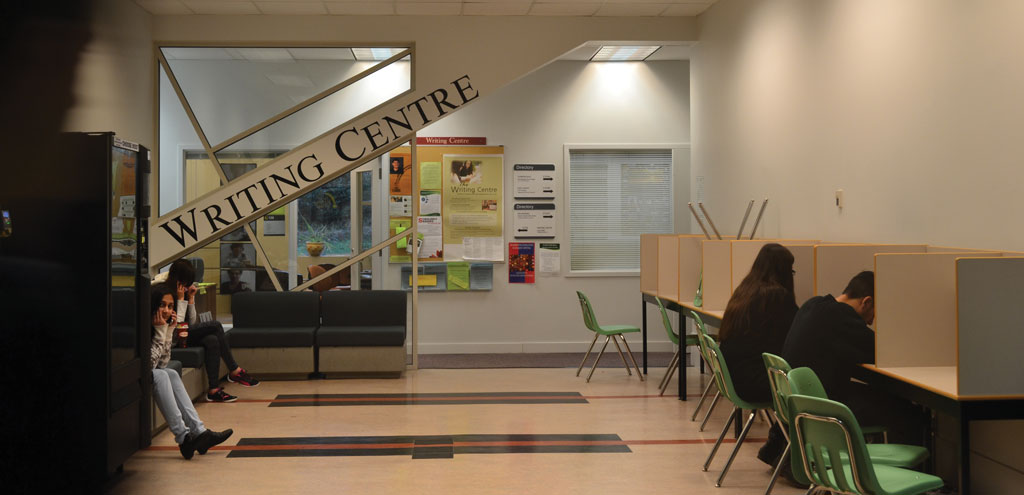By Megan Lambert (The Cascade) – Email
Print Edition: February 4, 2015

Two weeks ago UFV announced that an Academic Success Centre, a new peer tutoring service, will take the place of the Writing Centre.
Students in their third and fourth years will help other students with subject matter and core concepts in addition to writing.
For 26 years, the Writing Centre has been a service for students seeking help with writing assignments like essays, reports, or creative pieces. Rather than editing, instructors who hold post-graduate degrees sit down with students and help them express and synthesize their ideas in their work. The Writing Centre also offers workshops and awards, and has been a resource for faculty members and students alike.
Provost and VP Academic Eric Davis says that the change is not a cost-cutting exercise. “It is more cost-effective, but it’s not cost-cutting. It’s reallocating funds that will service more students,” he says. “I don’t think the quality will suffer at all.”
VP students Jody Gordon says that the centre will be changing to a more efficient framework.
“We have limited resources to work with, and we need to ensure that we can deliver the most support we can for our students,” she says.
Currently, students have the option of visiting their professors during office hours, consulting fellow students in their classes, meeting with student-led Supported Learning Groups (SLG) if they are in specific courses, or seeking private tutoring for help with course material.
Director of teaching and learning Maureen Wideman says that the Academic Success Centre is based on a peer-tutoring model other universities use, and will assist in both writing and course work.
“What we’re going to do is have support for students across all disciplines, not just writing,” she says.
“We have limited resources to work with, and we need to ensure that we can deliver the most support we can for our students.”
— Jody Gordon,
VP students
Writing Centre instructor Nadeane Trowse notes that the Writing Centre already teaches skills that apply to several disciplines.
“Interdisciplinary is kind of what we do,” she says. “A student is a multidisciplinary being. You are taking what, history, [political science], English, psychology, maybe a little biology — and yet you contain that all in one person.”
She notes that over the years, the Writing Centre faculty have offered support for the different styles and forms of writing in various areas of study.
“[The Writing Centre] supports them as they move through the various disciplines they encounter in their time at university, helping them see the distinctions between the kinds of writing they are asked to do and learn them efficiently,” she says.
Trowse explains that rather than educating a student on the subject matter, the Writing Centre helps students who already have a grasp on the concepts but struggle to express them on paper.
“We have always made sure that it’s not just about correcting errors, but getting people to learn more in this context about the writing that they’re doing,” Trowse says.
The new centre will be looking for upper-level students with solid grades and strong communication skills to act as tutors. Tutors will undergo 40 to 60 hours of training, and will work in paid positions supervised by two staff members and a faculty co-ordinator in Abbotsford and Chilliwack.
However, political science department head Hamish Telford notes that the Writing Centre faculty are a helpful resource for advanced students as well as beginners.
“… I don’t think there’s any substitute for highly trained professionals offering instruction to students who need it.”
— Hamish Telford,
political science
“It’s not just weak students learning how to write. There’s nothing more frustrating than being that student who always gets a B or a B+ and can’t crack the next level. The Writing Centre helps with those students as well,” he says.
In contrast, students in the last years of their degree, or those who are B students trying to improve their grades, may be at the same comprehension level as the peer tutors at the new centre. As of the end of this semester, those students won’t have the Writing Centre to go to for professional help.
UFV doesn’t currently offer a peer tutoring service, and so is using the same model as universities like SFU and UBC. Telford notes that peer tutoring is beneficial, but it is not as effective as professional help.
“I think there is a serious place for peer mentoring, but I don’t think there’s any substitute for highly trained professionals offering instruction to students who need it,” he says.
Along with assisting upper-level students, the Writing Centre faculty have been a helpful resource for fellow educators at the university. Although the six instructors have been offered teaching positions at UFV, Telford says it won’t be same.
“Faculty are losing that resource as well, and that’s deeply concerning,” he says.
“They’re going to be regular faculty members — teaching their own courses and working with their own students. I wouldn’t feel as comfortable dropping by their office hours to say, ‘I’ve got a problem, can you help me out?’”
The Writing Centre will be administratively handled by the faculty of teaching and learning as of April 1, and will continue to operate until the new centre opens in the fall.


